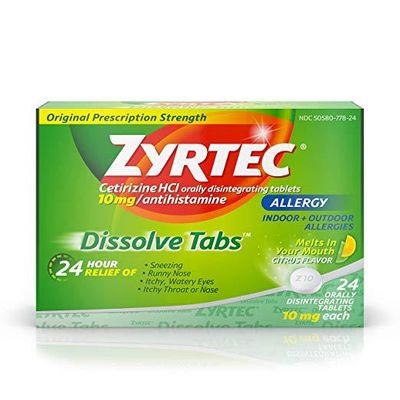People’s Pharmacy: FDA acknowledges Zyrtec withdrawal itch

Q. I have taken Zyrtec daily for over four years to manage animal and seasonal allergies. I recently went on vacation and did not take Zyrtec during that time. (I was away from the allergy sources, after all.)
After a few days off the medicine, I developed a sudden and excruciating itching. Oddly, it felt like it came from within my body rather than on the surface. The itch started in my inner thighs and spread to my sides and back.
Luckily, I went online and searched the reactions I was having. My symptoms matched those of others who stopped Zyrtec suddenly.
Once I realized this was a withdrawal reaction, I took a Zyrtec pill. Within the hour, the itching stopped. Now I am afraid to ever stop taking Zyrtec. The itch was very intense, and I don’t want to go through that again!
A. Readers of this column alerted us to this withdrawal phenomenon nearly a decade ago. At that time, cetirizine (Zyrtec) was available only by prescription. The prescribing information did not warn about a withdrawal itch reaction.
The Food and Drug Administration has now acknowledged that many people experience unbearable itching (pruritus) when they stop cetirizine suddenly (”Therapeutic Advances in Drug Safety,” July 5, 2019). According to the report: “Some patients described the itch as so intense that it impacted their ability to work, sleep or perform their normal daily activities …”
The agency now requires a warning about this withdrawal reaction in the prescribing information for cetirizine and its chemical cousin levocetirizine (Xyzal). As far as we can tell, however, this alert is not included in the over-the-counter labels.
Q. I take sildenafil (Viagra) for erectile dysfunction. It works quite well. But not long after taking it, I experience pretty unpleasant heartburn. Needless to say, this interferes with the romantic mood. Do you have any recommendations?
A. All of the erectile dysfunction drugs (sildenafil, tadalafil and vardenafil, aka Viagra, Cialis and Levitra) can cause heartburn as a side effect. They work by relaxing smooth muscle that lines the blood vessels going into the penis. However, smooth muscle elsewhere in the body, such as that in the lower esophageal sphincter in the digestive tract, also relaxes in response to these drugs. That promotes acid reflux.
Ask your doctor whether taking an antacid like Tums or Rolaids along with your sildenafil might relieve heartburn. Another option might be an acid-suppressing H2 antagonist like cimetidine (Tagamet), famotidine (Pepcid) or ranitidine (Zantac).
Q. A number of years ago, my prescription for Zoloft was changed to generic sertraline. It simultaneously became ineffective.
As a result, my doctor began adding other drugs to the generic sertraline to try to achieve a response against depression. After several attempts at different add-ons, I was prescribed generic Budeprion XL 300. Three days later, I suffered a grand mal seizure.
I quit all depression medications then and have suffered through major depression since that time. That seems marginally better than dealing with the potentially life-threatening side effects of these generic drugs. I’m not willing to be a guinea pig!
A. We document generic drug failures in general, and the Budeprion XL 300 debacle in particular, in our book “Top Screwups Doctors Make and How to Avoid Them.” Because there are flaws in the FDA’s system of approving and monitoring generic medications, you might want to read our Top 10 tips for taking generic drugs wisely in “Top Screwups.” It is available for purchase at peoplespharmacy.com.